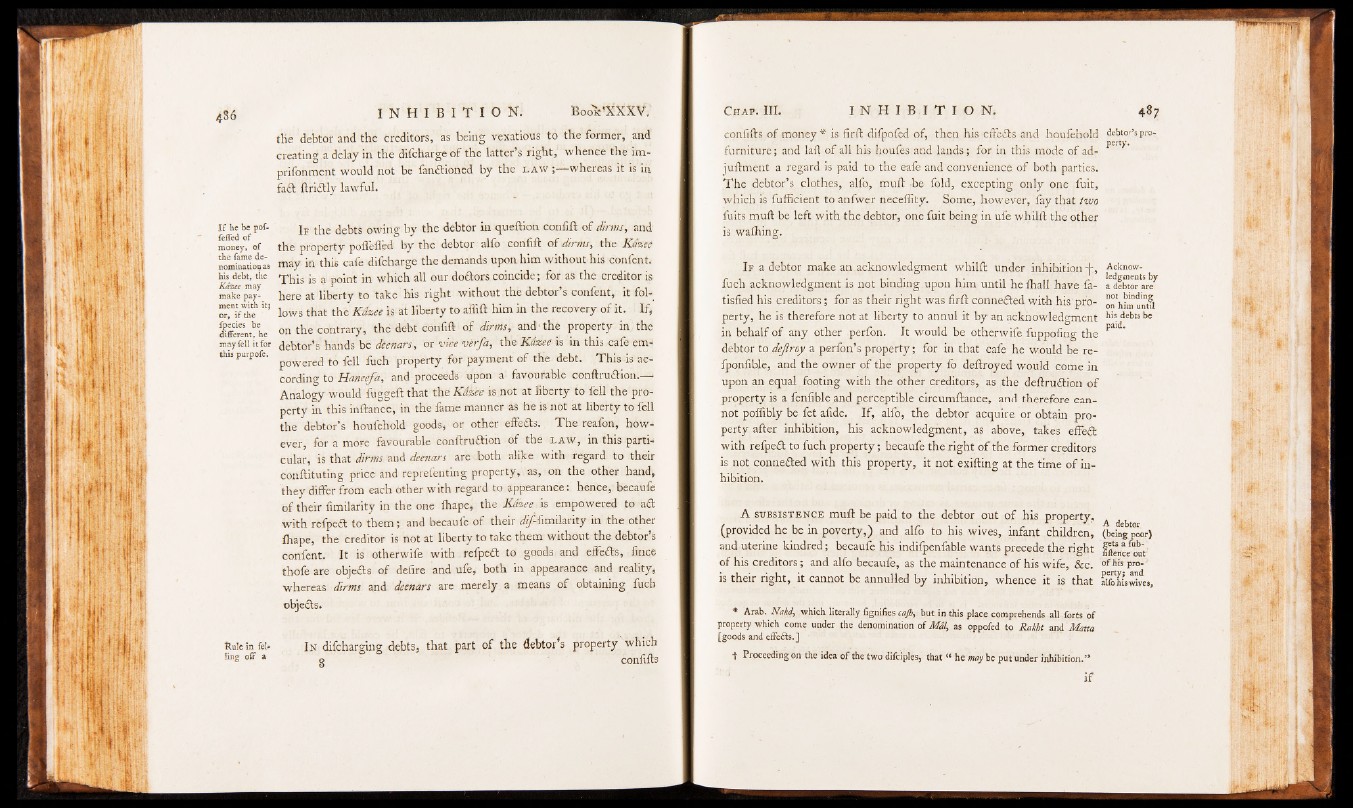
I f he be pof-
fefled o f
money, of
the fame denomination
as
his debt, the
Kazee may
make payment
with it}
or, i f the
fpecies be
different, he
may fell it for
this purpofe.
Hule in felling
off a
tHe debtor and the creditors, as being vexatious to the former, and
creating a delay in the difchargeof the latter’s right, whence the im-
prifonment would not be fan dl ion eel by the l aw ; whereas it is in
fadt ftridtly lawful.
If the debts owirtg by the debtor in queftion confift of dir ms, and
the property poflelfed by the debtor alfo confift of dirms, the.'Kazee
may in this cafe difeharge the demands upon him without his confent.
This is 4 point in which all our doctors coincide; for as the creditor is
here at liberty to take his right without the debtor’ s confent, it follows
that the Kazee is at liberty to aifift him in the recovery of it. If,
on the contrary, the debt confift of dirms, and-the property in the
debtor’ s hands be deenars, or vice verfa, the Kazee is in this .Cafe empowered
to fell fuch property for payment of the debt. This is according
to Haneefa, and proceeds upon a favourable conflruction.— ■
Analogy would fuggeft that the Kazee is not at liberty to fell the property
in this inftance, in the fame manner as he is not at liberty to fell
the debtor’s houfehold goods, or other effedts.. The reafon, however,
for a more favourable conftru&ion of the l aw , in this particular,
is that dirms and deenars are .both alike with regard to their
conftituting price and reprelentmg property, as, on the other hand,
they differ from each other with regard to appearance: hence, becaufe
of their fimilarity in the one fhape, the Kazee * is empowered to ad
with refpeft to them; and becaufe of their a'i/'-fimilarity in the other
fhape, the creditor is not at liberty to take them without the debtor’s
confent. It is otherwife with refpedt to goods and effedfs, fince
thofe are objedts of defire and ufe, both in appearance and reality,
whereas dirms and deenars are merely a means of obtaining fuch
objedts.
In difeharging debts, that part of the debtor s property which
g confifta
confifts of money * is firft difpofed of, then his effedts and houfehold debtor’s pro-
furniture ; and laft of all his houfes and lands; for in this mode of ad- P *
juftment a regard is paid to the eafe and convenience, of both parties.
The debtor’ s clothes, alfo, muft -be fold, excepting only one fuit,
which is fufficient to anfwer neceffity. Some, however, fay that two
fuits muft be left with the debtor, one fuit being in ufe whilft the other
is walhing.
I f a debtor make an. acknowledgment whilft under inhibition+ , Acknow-
fuch acknowledgment is not binding upon him until he fhall have fa- a^ebto” are^
tisfied his creditors; for as their right was firft connedted with his' pro- on'wmuntU
perty, he is therefore not at liberty to annul it by an acknowledgment debts be
in behalf of any other perfon. It would be otherwife fuppofing the Pa'd’
debtor to dejiroy a perfon’s property; for in that cafe he would be re-
fponfible, and the owner of the property fo deftroyed would come in
upon an equal footing with the other creditors, as the deftrudtion of
property is a fenfible and perceptible circumftance, and therefore cannot
poffibly be fet afide. If, alfo, the debtor acquire or obtain property
after inhibition, his acknowledgment, a? above, takes effect
with refpedt to fuch property; becaufe the right of the former creditors
is not connedted with this property, it not exifting at the time of inhibition.
A subsistence muft be paid to the debtor out of his property.
(provided he be in poverty,) and alfo to his wives, infant children, (being poor)
and uterine kindred; becaufe his indifpenfable wants precede the right | B | B
of his creditors; and alfo becaufe, as the maintenance of his wife, &c. bfs pro-
is their right, it cannot be annulled by inhibition, whence it is that alfo his wives,
* Arab. Nakd, which literally Signifies cajh, but in this place comprehends all forts o f
property which come under the denomination o f M a i, as oppofed to Rakht and M alta
[goods and effe&s.]
t Proceeding on the idea of the two difciples, that u he may be put under inhibition.’*
if